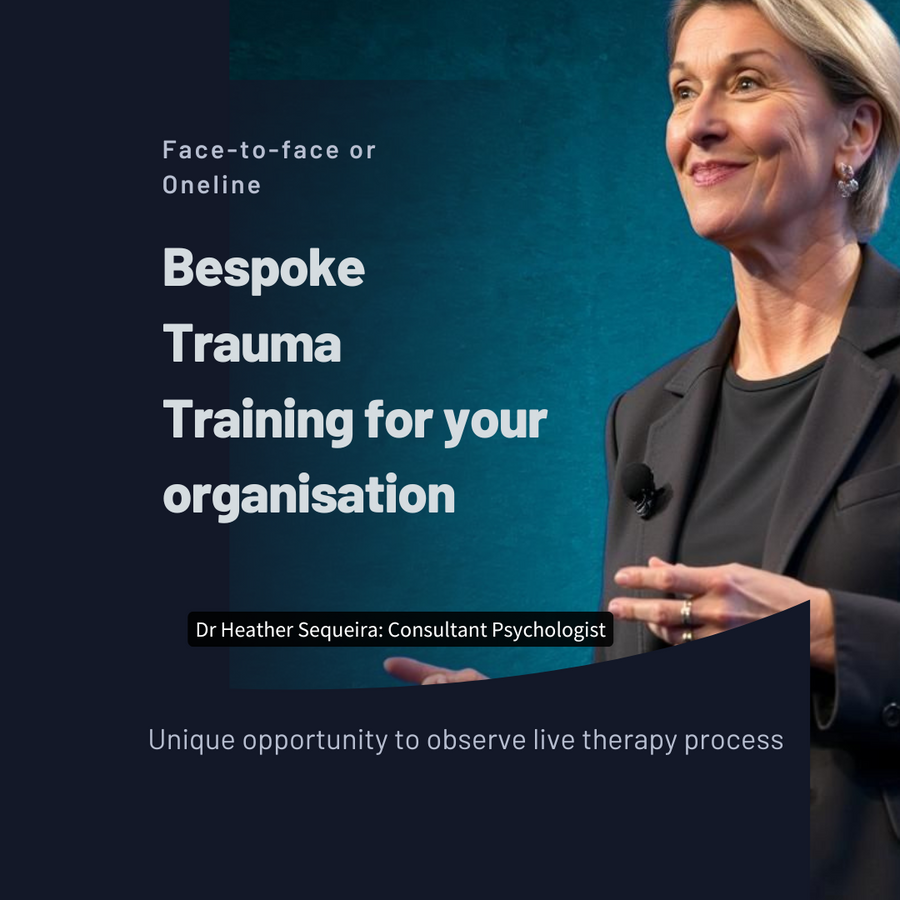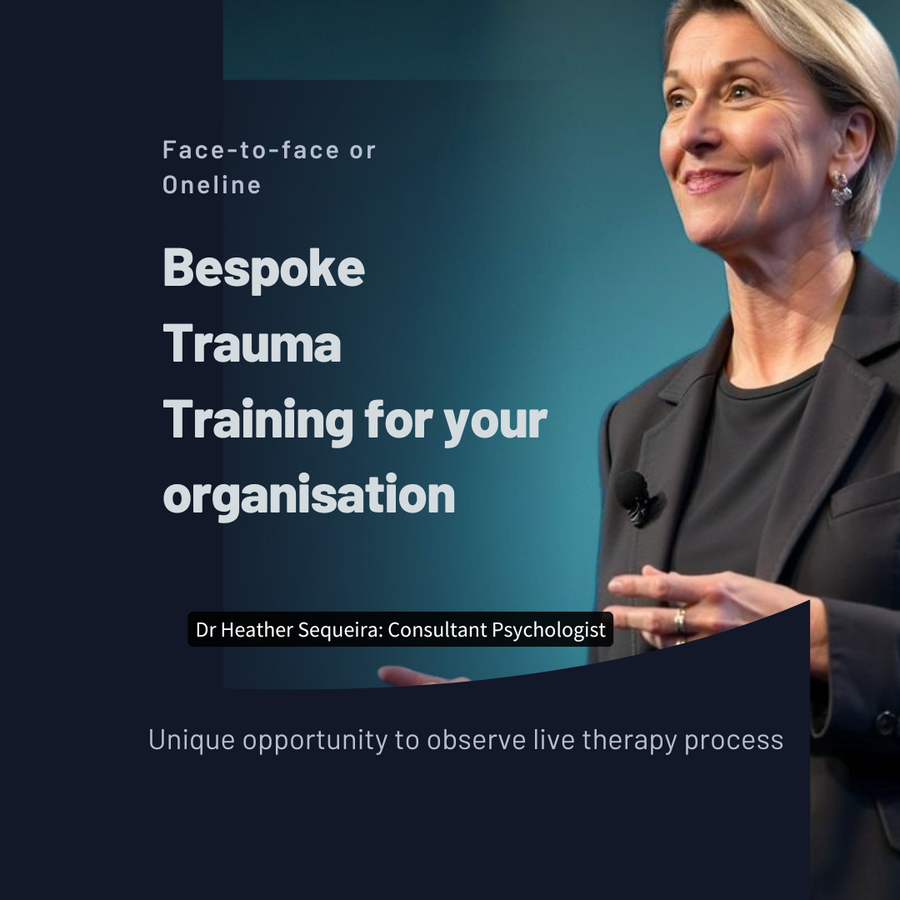Your Cart is Empty
Complex Trauma, Dissociation & Flashbacks # 8-9 May 2025 # LIVE, Online, Interactive Workshop #
£259.00
From Early Adversity to Adult Distress: The Lasting Impact of Complex & Attachment Trauma
Workshop Overview: Compassion in Action
Childhood trauma leaves a profound imprint — not only in memory but in the biology of the nervous system, brain and body.
Complex trauma is not simply a psychological story to be told; it is a lived, somatic reality. It rewires stress responses, disrupts attachment systems, fragments sensory processing, and embeds patterns of disconnection and dysregulation deep within the body's physiology.
This 2-day CPD workshop offers a compassion-focused, neurobiologically grounded, and somatically attuned approach to understanding and treating the lasting impact of developmental trauma.
It goes beyond standard CBT models, offering a sophisticated integration of compassion-focused somatic therapy, attachment-based formulations, and current neuroscience to equip practitioners with actionable, real-world strategies for working with complex trauma in a safe and effective way.
Why Working Only with Trauma "Stories" Often Misses the Real Entry Point for Change
While trauma narratives have their place, true healing requires us to go deeper — to the biology of trauma:
-
How trauma lives in the nervous system
-
How it shapes the body's experience of threat, connection and regulation
-
How it can quietly block healing, even when therapy is insightful
We Will Cover:
🔵 Neurobiology and Somatic Impact of Developmental Trauma
-
How age of trauma, neglect vs abuse, and cumulative adversity affect development
-
How developmental trauma shapes nervous system calibration
-
The chemical cascades — cortisol, adrenaline, acetylcholine — that drive survival responses
-
Hormonal and inflammatory biomarkers in complex trauma
🔵 Dissociation, Body-Based Symptoms and Clinical Complexity
-
Dissociation as multiple phenomena — depersonalisation, derealisation, memory fragmentation
-
Pseudo-hallucinations, perceptual distortions, medically unexplained symptoms
-
The difference between Freeze response and Tonic Immobility — and why it matters
-
How trauma traps the body in survival patterns and how to intervene somatically
🔵 Attachment, Trust and the Social Engagement System
-
How early relational trauma affects trust, shame, and connection
-
How to work when a client’s social engagement system "goes offline"
-
How interpersonal neurobiology helps map client stuckness and relational reactivity
🔵 Live Observational Skills and Real-Time Clinical Decision Making
-
Live clinical skills practice with a professional actor portraying "Rachel" — a trauma-exposed client
-
Observe relational interventions for dissociation, overwhelming affect, and shame in real time
-
Discussion of therapy pitfalls, stuck points, and the need for difficult clinical decisions
🔵 Strategies for Trauma-Sensitive, Body-Aware Practice
-
Breathwork, posture, and vision-focused interventions to regulate dissociation and affect
-
Building resilience and activating client resources safely
-
Safe and effective use of narrative exposure for complex trauma
-
Integrating body-focused interventions into trauma-focused therapy sessions
Format
✔️ 13-hour CPD, recognised training
✔️ Online interactive workshop — applicable to both face-to-face and online therapy work
✔️ Case-based learning and live observational demonstrations
✔️ Grounded in relational CBT but extends beyond it with a somatic, neurobiological, and attachment-integrated focus
✔️ Evidence-based, research-informed, immediately practical clinical skills
Who Should Attend?
Psychologists, counsellors, psychotherapists, and mental health professionals working with trauma-exposed clients in clinical practice.
Participants are expected to have prior training in PTSD or trauma-focused work before attending.
🧠 If you are ready to deepen your skills beyond traditional approaches — and understand trauma as it lives in the body and the brain — we invite you to join us.
'Live Observation’ of the therapy process as it unfolds
Most clinicians struggle to make recent research updates relevant to everyday practice. We use ‘hands-on’ empirically driven, relational CBT, CFT and Somatic Approaches.
With the help of a professional actor attending our therapy session as a live 'client,' We will work with high levels of dissociation and self-harm. We will dive into real work complexities and discuss therapy pitfalls & the need for difficult balanced decisions.
As an Intermediate-Advanced Level workshop, Practitioners are advised to attend the PTSD Master Class Workshopprior to attending.
Presenter
- ◄Presenter Dr Heather Sequeira PhD
-
Dr Heather Sequeira PhD has a solid background in Trauma related research and worked as Senior Research Fellow, University of London prior to training as a clinician. Heather is now an executive committee member of the British Psychological Society Crisis, Disaster & Trauma BPS Section. She has input to British Psychological Society CPD, Clinical Psychology Doctoral Training programmes and CBT Diploma Courses. She has 20 years NHS experience, plus private practice and organisational context work. She has a particular specialty in Complex PTSD & Trauma-related OCD.
The unique style of PTSD Trauma Workshop was born not only out of the above expertise but from supervising other psychologists, trainees and therapists. These clinicians were often highly trained and experienced, but what they said they lacked was the opportunity to observe other clinicians at work. They said that what they really wanted was to ‘look over the shoulder’ to observe another clinicians to help build both skills and confidence. Often supervises were struggling with similar therapeutic issues, despite being at different stages of the professional journey and they wanted to push the boundaries of their own learning within a safe, non-judgmental space.
The workshops are a unique response to the above needs: The workshops focus on "real-life" clinical issues, clients who are "stuck" or who have complex needs. They are highly practical, with clinical observation using the live actor "therapy simulation" and video footage for skills work. We offer a stop & pause format so that delegates can stop, discuss, and pull open the clinical decision-making steps at each stage of the therapy process. The process brings life-like and safer skills practice into the workshop. This process offers unique hands-on training for professionals with sound theory to practice transfer.
Heather's expert knowledge of clinical practice, extensive research experience and excellent training skills make her the most stimulating trainer to work with.
- ◄Live therapy demonstration & skills practice
-
This is a highly practical training with ample opportunity to see live demonstration of Trauma-Focused therapy. We use a professional actor as our client. This helps us to to map out the therapy interaction in the most realistic way possible, whilst effectively integrating theory with practice. We try not to shy away from real work complexities, therapy pitfalls & tough decisions. This is a fantastic opportunity to look inside the therapy process, with an extensive debrief into both the decision making & intervention processes.
Interaction and small group discussion is encouraged but no pressure is placed on people who prefer to sit back and take it all in.
- ◄Continuing Professional Development (CPD Hours) Certificate of Attendance:
-
You will receive a Certificate of Attendance for hours of CPD at your workshop.
- 6 Hours for a 1 day workshop
- 12 Hours for a 2 day workshop
- 18 Hours for a 3 day workshop
Please check that you have told us the correct name to be printed on your certificate, especially if you are from an organisation and booking a workshop for someone else.
- ◄Levels of Competence
-
Delegates are required to be qualified mental health practitioners (i.e. have registration with a Regulatory Body such as HPCP or accreditation with a relevant professional body) OR to be in training / in the process of gaining such accreditation. A CPD workshop does not qualify you to practice psychological therapy. For this you need a appropriate professional qualification and validation by an appropriate regulatory body. Delegates are required to have appropriate psychological supervision for their practice.
There may be occasional exceptions in attendance to the above requirement (for example, a trauma researcher or similar who is not practicing with clients but requires insight and infomation for research purposes). Any exception to the above requirement has to be agreed with us in advance. Please do get in touch to discuss.
Level of Competence Required:
Before booking a place on a workshop, please ensure that it is pitched at the appropriate level of competence for you. The competence level [Preliminary, Intermediate, Advanceded] of each workshop is listed on each booking page. The 3 different workshop levels are as follows:
Preliminary Level Workshops
Preliminary workshops are for people from a variety of psychological therapy backgrounds who are looking for grounding in the basic concepts or a recap. These courses ideal for professionals who want to develop & their practice skills to help clients with a history of trauma. It is also an excellent recap for advanced level practitioners. Whether clinicians are counsellors getting their first exposure to CBT for trauma or seasoned practitioners wanting a refresher, this will satisfy professional training needs. For Preliminary workshops, NO prior CBT experience is necessary.
Intermediate Level Workshops
Intermediate level workshops are directed to trained mental health practitioners who are familiar with and able to use the fundamental principles of CBT and Relational Approaches. For example, practitioners are able to use formulation, identify automatic thoughts and able to help clients test these thoughts. To use the enhanced reliving components with your clients, practitioners should have skills in CBT and be supervised by practitioner who uses reliving as part of their own clinical practice and is competent to do so.
Advanced Level Workshops
Advanced courses are directed towards those professionals who already have additional training in PTSD and Trauma and use CBT and other Relational Approaches routinely as part of their clinical practice. They have probably undertaken a significant number of training courses and/or workshops, and use a broad range of strategies to work with a range of presentations at varying levels of complexity.
These workshops are defined as Continuing Professional Development. As such they are designed for people with a recognised UK psychological therapy qualification or for those in training for such qualification. Although highly informative, none of workshops confer a formal qualification or assurance of competence in any aspect of psychological therapy since we are unable to assess attendee competency within the training event.
- ◄Confidentiality
-
Workshops contain clinical material. This is always anonymised as far as possible but delegates are none the less reminded to respect confidentiality and to anonymise any clinical material that they bring to the workshops.
Just as in therapy sessions, workshop sessions will be treated as confidential, with the following exceptions. As a Chartered and Registered Psychologist I am required to seek supervision by my professional body (The British Psychological Society) and regulatory body (HPCP) as a means of ensuring good practice. We do have a statutory obligation to break confidentiality under rare circumstances, namely, if I believe that a person is of danger to themselves or to others (under the Mental Health Act, 2001) or if I believe that a child is at actual risk of physical or sexual abuse (The Children Act, Section 47, 1989)
- ◄Self-Care & Special Needs
-
Our own professional responsibility for good self-care is emphasised throughout the trainings. All the Workshops contain detailed discussion of clinical case material and simulated client work. This includes (but is not limited to) sexual assault, sexual abuse, interpersonal violence, accidents, RTAs, war and other types of trauma. If you are in doubt as to whether this CPD workshop is appropriate for you, please discuss with us in confidence.
We welcome people from diverse backgrounds. If you have any particular needs, please contact us prior to booking.








